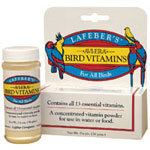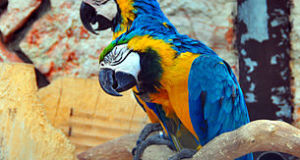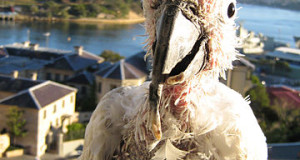All parrots occasionally sneeze to clear their nares (nostrils). However, frequent sneezing and the discharge of mucus is cause for concern. Sometimes, a simple environmental change, such as the use of a humidifier, is all that is required. In other cases conditions ranging from bacterial or viral infections to tumors, air sac mites or nutritional deficiencies may be involved. Unfortunately, even if it is obvious that dry or dusty air is playing a role, medical issues cannot be ruled out without veterinary advice – websites purporting to aid in home diagnosis should not be relied upon. In this article, we’ll review some common causes of sneezing and nasal discharge in budgies, cockatiels, cockatoos and other parrots.
General Considerations
As mentioned, an occasional sneeze is normal. The presence of mucus or other nasal discharge (with or without sneezing) should be taken as a danger sign. Although typically associated with respiratory or related infections, mucus may also be formed when parrots need to rid their nares of dust, or in response to smoke or other chemical irritants. Either way, prompt action is needed. While veterinarians can draw some conclusions from the mucus’ appearance – clear, thick, coloration, presence of blood, etc. – pet owners should not speculate and attempt to resolve the problem without expert assistance.
Your Parrot’s Environment
Environmental problems are easier to remedy than are medical concerns. While some budgies (parakeets) and some other species are adapted to arid habitats, most parrots are native to environments that are relatively humid for much or all of the year. Indoor air in dry regions, and any indoor air that is heated or air-conditioned, is too dry for many commonly-kept parrots.
Fumes and mist or smoke from cooking, household cleaners and the like can also irritate the respiratory tract, leading to sneezing and the over-production of mucus.
Air filters, humidifiers, misting, live plants and saline flushes can be used to improve your pet’s environment. However, be careful not to let environmental concerns mask a more serious medical condition – both can exist simultaneously. Even if it is obvious that your home is too dry for your parrot, err on the side of caution and see a veterinarian.
Medical Concerns for Sneezing
Medical concerns that may be involved include fungal, bacterial, viral or yeast infections. Parrots that have such ailments will usually show other symptoms as well, including appetite loss, a reluctance to move about, and labored breathing. However, a bird may battle an infection for some time, behaving normally until a critical point is reached, at which time its condition can decline very quickly. Therefore, a vet visit is prudent as soon as you notice unusual sneezing or a nasal discharge.
Any type of nutritional problem can weaken the immune system, leaving your pet open to attack by a variety of pathogens. Vitamin A is of particular importance, as it is vital to the development of the cells lining the respiratory system. Abnormal cells, common in Vitamin A deficient birds, seem to be easy targets for bacteria and other pathogens. Most seeds are low in Vitamin A, while pellets and many fruits and vegetables have higher levels. If your pet is on a seed-based diet, a vitamin supplement should be considered. Please post below, and see the linked articles, for information on incorporating pellets and produce into parrot diets.
Other Possibilities
Tumors and other growths in the nares, sinuses or related areas may cause dry sneezing. Parrots suffering from an air sac mite infestation may exhibit labored, open-mouthed breathing.
Further Reading
Nutriberries and Pellets: Improving Your Parrot’s Diet
Parrot Health: Labored Breathing and Respiratory Distress
 That Bird Blog – Bird Care and History for Pet Birds
That Bird Blog – Bird Care and History for Pet Birds






My granddaughter just got a dusky conure for her birthday. He is a very friendly loving bird. He enjoys being with her as she goes about her day. He loves riding on her shoulder, and has also taken to my daughter and myself. He has been sneezing quite a bit, and I actually felt droplets from him sneezing while sitting on my shoulder. My granddaughter says she has felt that too. Is this something we need to worry about?
Hell Cyndie,
Dry sneezes are just to clear the nares/nostrils, Wet sneezes may occur on occassion for the same reason. But if they are frequent, the bird should be seen by a vet to check fo an infection, etc. Do not let the bird sit on your shoulder for now, so as to avoid exposure to micro-organisms/germs that may be present in the mucus, and wash well after handling. Please let me know if you need hlp in locating n avian veterinarian. best, Frank
Hi~I have a 7 yr old Golden Capped Conure who sees an Avian Vet regularly and gets a clean bill of health. I live in the SF BayArea where we have recently gotten a lot of rain & also its been cold now in December. Tonight I gave my conure a treat of his favorite millet spray…I only rarely do this as I know his Zupreem pellet diet is so important. Freddie started sneezing shortly after munching half the spray stalk. I looked closer & saw clear discharge right above the nares. I got panicked and read online that sometimes seed hulls can enter a parrot’s nares…OK yes I know about infectious processes cuz I’m an RN~but Freddie’s other behavior is normal~I removed the millet and now he’s playing and eating the pellets…as far as I can tell there is no more nasal fluid, occasionally he will sneeze but not like after attacking his millet. Yes we have had the heat on lately as I think it might cause his sneezing. Please tell me if it’s okay to give him his usual shower for humidity?! Since it’s been colder this December I have been worried about him getting the shower (I always wrap him in warm towel)…I hope the sneezing was just cuz he was expelling some millet hulls…thanx…please RSVP Leila
Hello Leila,
A bit of sneezing as you describe is normal, either to dislodge a husk or for to otherwise clear the passage. Skipping a shower would be prudent for now, just to be sure that an infection etc is not developing. Happy, healthy new year, Frank
Hello Frank! Thanx for your reply…guess what?! My vet’s office stated that”Skipping routine showers is the worst intervention since the only available moisture left in the house is taken when the heat is on” LOL!…well since I have been showering Freddie & keeping the heat on plus using a warmed towel right after~it DOES appear to be keeping his mucus membranes lubricated thus providing a clear airway! Freddie is less irritable and I guess the shower helps rid the dander increasing his preening. I was told to watch for anymore nasal drainage… (I just knocked on wood as he has no more bouts of sneezing or nasal drainage at this time). My next question is “Is it my imagination…or do parrots sense their owners frustrations like dogs thus acting out “playing sick” to then have its owner display more and more attention to it?!…attention getting means that parrots must indeed possess a brain capable of some rationalizing to exceed Pavlov’s Theory. Thank you again…Leila
Hello Leila,
Sorry for the delay, I missed your post somehow. I’m not sure about their ability to sense human emotions, but it would certainly not be out of the question for one to hit on something that draws attention and then rely upon it regularly. It’s difficult to access and quantify such things, unfortunately, but the potential may be there – please see this article.
I hope all continues to go well, Frank